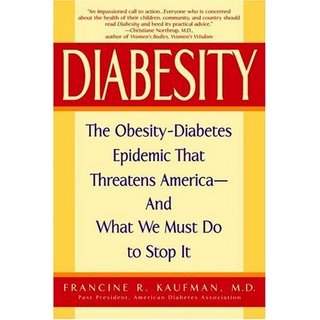Book: Diabesity : The Obesity-Diabetes Epidemic That Threatens America--And What We Must Do to Stop It (Hardcover)

Available at Amazon.com
Editorial Reviews
Amazon.com
Just as Fast Food Nation appalled thousands of readers into boycotting McDonalds and its ilk, one can hope that Diabesity might galvanize the public to help prevent a mind-bogglingly huge epidemic from snowballing. Type II diabetes used to be a disease of the elderly; in 1997, the American Diabetes Association decided to do away with the term "adult-onset diabetes," as it increasingly appeared in middle-aged patients, young adults, and teens. It's now appearing in obese children, and affects nearly 10 percent of the American population;[p. 13] what's most unbelievable is that its prevalence nearly doubled between 1990 and 2002, and shows no signs of abating, as every overweight American--that's 64 percent of the population--is at elevated risk.
Diabesity will likely petrify anyone recently diagnosed with diabetes into scrupulously monitoring their blood-sugar level, with frightening stories of blindness, heart attacks, kidney failure, gangrene, impotence in males, and infertility in females, and other side effects from diabetics' elevated blood sugar. Dr. Kaufman gets a little full of herself when she describes audiences—from school boards to World Health Organization assemblies—going wild after her speeches on diabetes. But as a pediatric endocrinologist since the 1970s, she's seen first-hand the rise of the diabetes epidemic, with comatose children appearing in her Los Angeles emergency room with blood-sugar levels 10 times what's considered healthy, so high that they can't be read with present-day equipment.
Curiously absent in Diabesity is any mention of the potential link between infant formula and the later development of diabetes. But Kaufman wins points for chronicling the fight to have L.A. ban soda sales in the schools. ("Sodas are the leading source of added sugar in children's diets.") Her descriptions of the cultural and economic differences among the diabetes epidemics in China, India, and Ecuador are also intriguing. The book should be considered essential for parents, teachers, and day-care providers; it's grim reading, but that's a small sacrifice compared to a life being cut short 20 years by a largely preventable disease. --Erica JorgensenFrom Publishers Weekly
Kaufman explains the severity of the obesity/diabetes epidemic this way: "our ancient genes and our modern environment have collided," and so many adults and children are now being diagnosed with the disease that it "imperils human existence as we now know it." The author, who recently served as president of the American Diabetes Association and was instrumental in banning the sale of soda in Los Angeles schools, notes that the sharp increase in the number of diabetics in the U.S. mirrors the increased incidence of obesity (hence the word "diabesity," first used by health journalists in the late 1990s). Her first-rate, important book discusses the diagnosis of diabetes and its subsequent sequelae, the world history of both diabetes and obesity, and, most importantly, what must be done to fix the problem. Not so much a how-to for patients as a call to arms for policy makers and those in the health-care industry, the book intersperses riveting case studies that serve to accentuate the importance of "creating a new normal" mode of behavior in American culture—one that includes eating intelligently and exercising diligently. Kaufman has taken on a difficult topic, but her text is easy to understand and will be useful to many.
| Reviewer: | Paul Tognetti (Cranston, RI USA) |
But "Diabesity" is also a book about public policy. How is it that we have allowed our schools to be infiltrated by giant corporations who peddle their soft drinks and fast foods to our young people. As Dr. Kaufman points out, the National School Lunch Program, which was established in the 1950's to provide nutritious meals at a low subsidized price, has been to varying degrees augmented and in many cases supplanted by what are termed "competitive foods". I had never heard the term. "Competitive foods" compete with USDA meals and are sold at the snack line in the cafeteria and in innumerable vending machines at the schools. You might have guessed that what is being sold here is soda, snack cakes, chips, hot dogs, french fries and pizza. You get the picture. It is an outrage. Happily, as Dr. Kaufman points out, some enlightened school districts have begun to fight back. "Diabesity" also delves into a number of other public policy questions that I can report make for extremely informative reading.
Finally, Dr. Kaufman has used the pages of her book to introduce us to some of the diabetes patients she has treated over the years. She has been able to help a good many of them and has had the satisfaction of seeing many go on to lead nearly normal lives. But then there are those who she was not able to help. Dr. Kaufman allows the reader to share in a very personal way her frustrations and her sadness. It is compelling reading.
"Diabesity" will enlighten you about the realities of diabetes.
It is a book that just might change your life. It was not a book I was anxious to read but one that I felt was important to read. Highly recommended.
| Reviewer: | William E. Adams (Lovington, NM United States) |

0 Comments:
Post a Comment
<< Home